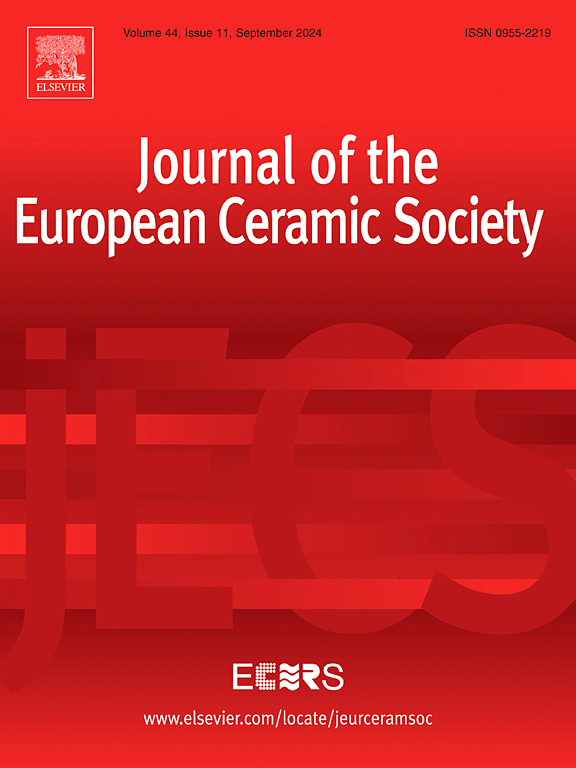开发可放电加工的 SiC-ZrN 复合材料:揭示高温滑动耐磨性
IF 5.8
2区 材料科学
Q1 MATERIALS SCIENCE, CERAMICS
Journal of The European Ceramic Society
Pub Date : 2024-10-30
DOI:10.1016/j.jeurceramsoc.2024.117040
引用次数: 0
摘要
利用火花等离子烧结技术,在氮气环境中于 1800 °C 下烧结 5 分钟,并加入 AlN-Y2O3 添加剂,开发出了致密的碳化硅-(10-30 vol%)氮化锆复合材料。ZrN 表面的新生氧化物降低了液相形成温度,从而提高了碳化硅陶瓷的致密性。添加 ZrN 后,陶瓷的机械性能得以保持,导电率也有所提高。为了展示快速、低成本的碳化硅陶瓷加工替代方法,使用线切割放电加工技术成功切割了碳化硅-ZrN 复合材料。研究了可放电加工的新型 SiC-ZrN 复合材料盘与 SiC 球在不同条件下往复滑动接触的摩擦学潜力。在室温(25 ℃)下,摩擦力受增强成分的影响较小,但在高温(600 ℃)下,摩擦力发生了显著变化。据报告,温度从 25 ℃ 升至 600 ℃ 时,磨损率至少降低一个数量级。随着温度的升高,主要的磨损机理从磨损转变为三氧化反应。本文章由计算机程序翻译,如有差异,请以英文原文为准。
Development of electrical discharge machinable SiC-ZrN composites: Unveiling high temperature sliding wear resistance
Dense SiC-(10-30 vol%) ZrN composites were developed using spark plasma sintering with AlN-Y2O3 additives at 1800 °C for 5 min in nitrogen atmosphere. The nascent oxide present on ZrN surface reduces liquid phase formation temperature, facilitating improved densification of SiC ceramics. Mechanical properties were retained, and electrical conductivity increased with ZrN addition. To demonstrate a rapid and low-cost machining alternative for SiC ceramics, SiC-ZrN composites were successfully cut using wire-EDM. The tribological potential of novel electrical discharge machinable SiC-ZrN composite disk against SiC ball at various conditions of reciprocating sliding contacts was investigated. Friction is less affected by reinforcement content at room temperature (25 ℃) but significant change is observed at high temperature (600 ℃). Minimum one order of lower wear rate is reported with an increase in temperature from 25 ℃ to 600 ℃. The major wear mechanism changed from abrasion to tribo oxidation with increase in temperature.
求助全文
通过发布文献求助,成功后即可免费获取论文全文。
去求助
来源期刊

Journal of The European Ceramic Society
工程技术-材料科学:硅酸盐
CiteScore
10.70
自引率
12.30%
发文量
863
审稿时长
35 days
期刊介绍:
The Journal of the European Ceramic Society publishes the results of original research and reviews relating to ceramic materials. Papers of either an experimental or theoretical character will be welcomed on a fully international basis. The emphasis is on novel generic science concerning the relationships between processing, microstructure and properties of polycrystalline ceramics consolidated at high temperature. Papers may relate to any of the conventional categories of ceramic: structural, functional, traditional or composite. The central objective is to sustain a high standard of research quality by means of appropriate reviewing procedures.
 求助内容:
求助内容: 应助结果提醒方式:
应助结果提醒方式:


